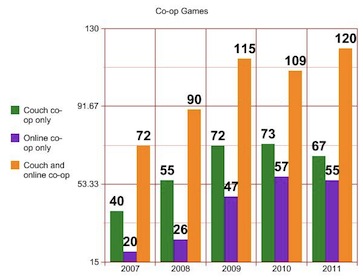Ever since the days of the Atari and other home gaming consoles long past, there's been co-operative gaming. It's one of the aspects of gaming's history that almost every modern gamer shares, be they an old hand or a fresh little spratling in the world of video gaming. While now, the majority of co-op game play happens online, there was a time where 'going to play some games with friends meant actually physically leaving your house, and going to that friend's place, or going to the arcade. Since the advent of the current generation of consoles, we've seen the prevalence of online games skyrocket, and the need for couch co-op is no longer as dire as it once was. This has created a sort of myth around couch co-op that it's slowly dying out, or becoming obsolete. We'll show you that that's simply not the case, and explore some things couch co-op does better than online can -- and vice versa. Because while co-op gaming will never die, it has changed in some pretty exciting ways.
To begin with, we'll discuss the pervasive myth that couch co-op is dying out. And before we go asking about what source the myth comes from, don't bother. It's not something that really exists in print, or as something you see many websites or other publications talking about. It's more of a shared myth between gamers and within gaming culture. As online co-op gaming has become more and more advanced and widespread, it's become the primary way most of us enjoy co-op. This diminishment of use has resulted in a perceived diminishment of availability of couch co-op games. This is a myth we can easily disprove. A little digging into the Co-Optimus database quickly provided us with simple numerical proof that couch co-op is not dying:

In fact, there are more games with couch co-op within the last few years than there are without. But if there's simply no truth to the myth, then why does it exist in the first place?
Part of this is most likely owed to a parallel myth, the one about the profitability of online co-op. Basically, there's a second assumption made by some gamers that online co-op is more profitable, and hence would create a scarcity of sorts of couch co-op games, because a lot of companies make decisions due to their bottom line. After all, if two people each buy a copy of a game to play it online, that's two copies sold, and double the profits - right? The problem is that that math only really checks out if you assume the following: it takes exactly as much time, money, and effort to produce a good online engine as it does to code couch co-op, and that running a server is free and any support staff you have for the online portion doesn't get paid. But that's not the case.

Yeah, don't count on talking to her if you call in because of "server problems."
The creation, testing, and base implementation of a good online engine is very expensive. Maintaining the servers for people to play on is very expensive. Hiring a full online support staff including engineers, in-game moderators, and support staff for THAT support staff (Human resources, janitors, and rent/utilities wherever they may be staying) is very VERY expensive. Implementing co-op on a single system is comparably much easier and less demanding of resources. Not only that, simply creating online co-op doesn’t automatically mean two or more sales. So the myth of inherent profitability falls on it's face. But we can nevertheless deny that online co-op is growing immensely in popularity, whereas couch co-op has reached a sort of stasis in the last few years. Before we can discuss whether that's good or bad, however, we'll need a brief overview of multiplayer gaming from its earlier days to now.
For me, couch co-op when I was young could be summed up in two words: Ninja Turtles. I can vividly recall entire days -- weeks, even -- spent playing the SNES classic Turtles in Time with friends. We'd have groups of so many guys waiting to play, all because the only guy around with a SNES and Turtles in Time was Jamie. This demonstrable market for multiplayer gaming helped contribute to the N64's awesome 4 controller setup. The PS2 released their multitap, too, so you could get as many people on the console as the processors could easily allow. One of the first home consoles to use an internet connection for full co-op gameplay, however was the Sega Dreamcast, and Phantasy Star Online was born. The dreamcast was technically ambitious, for certain, beating Microsoft, Sony and nintendo to the online party by a decent margin Now, the wrench in the gears of this progress was the fact that the Dreamcast failed - badly. For a multitude of reasons that have been discussed widely enough that We don't need to get into them here. But the dreamcast left at least one legacy - Now that a console had been made that could play over the internet, anything without that capability would seem lacking - even if the dreamcast itself failed hard enough to get Sega downsized to third party.
